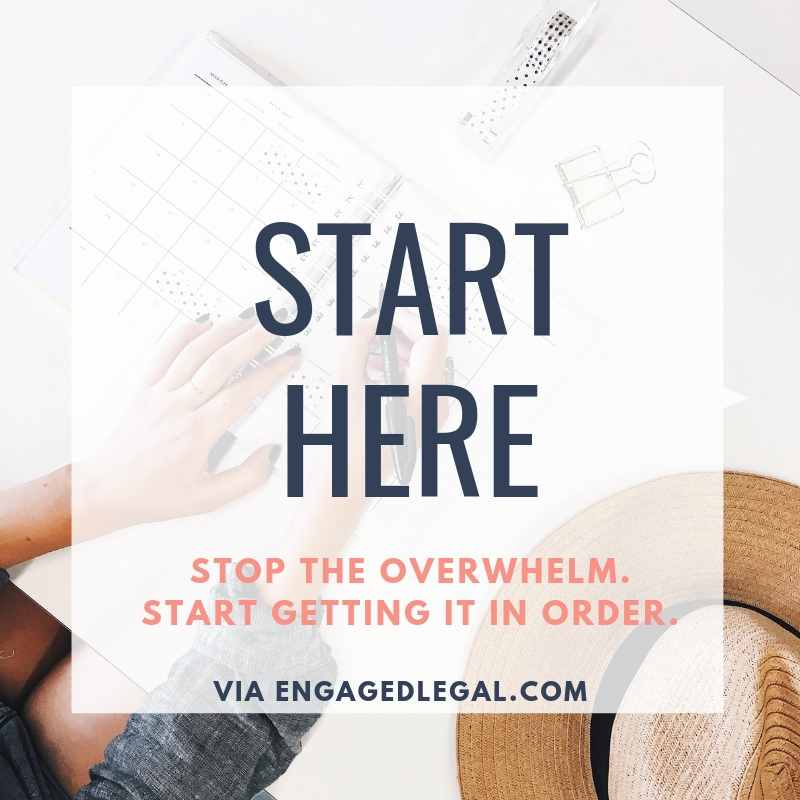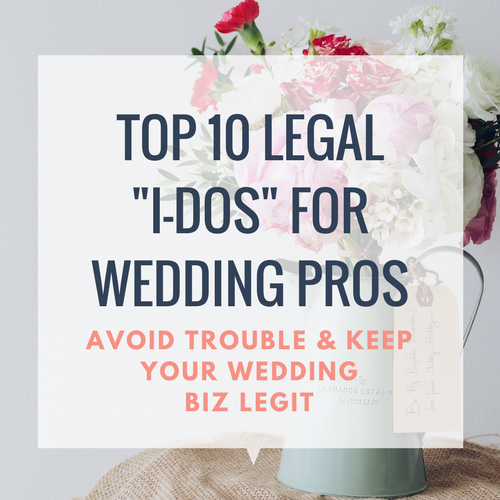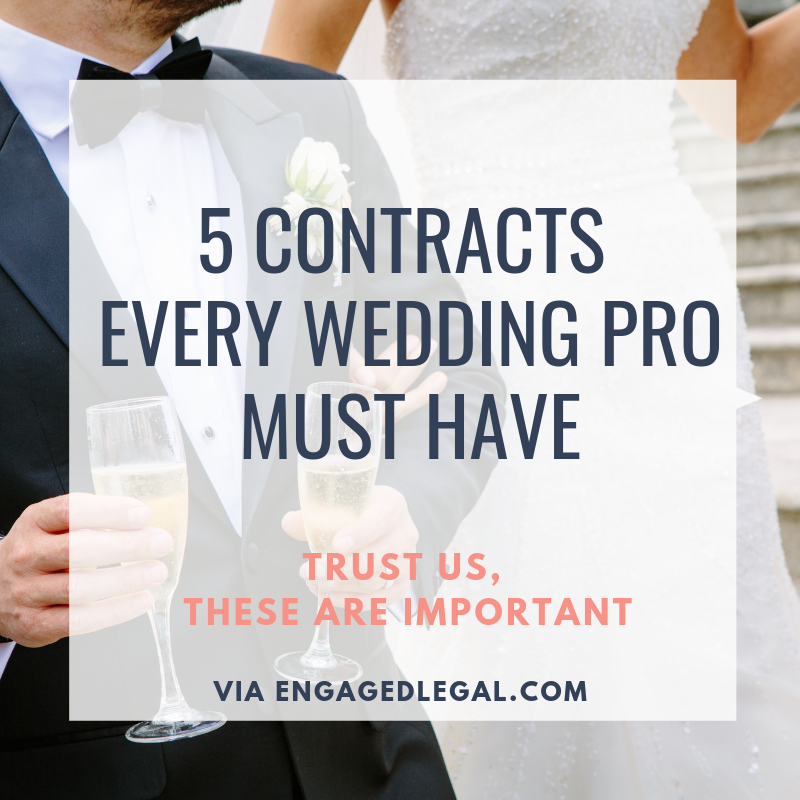[FREE SAMPLE COVID-19 WAIVER] - Do I need a COVID Waiver for Weddings and Events? HOT TAKE
/Now that the world is beginning to open back up, I’m hearing a LOT of questions about liability waivers. “Do I need a liability waiver for my events!?” is now the hottest topic in my instagram DMs.
What’s a liability waiver? It’s a document someone signs that essentially says “I agree that you aren’t liable for me getting hurt/ injured/ dying.” It sets you, a provider, up as “not responsible” for something happening.
But…. are these effective? Are they even enforceable? And….. spoiler alert: what’s a better option?
I have a hot take. 🔥 And want to give you some free example language to use!
Let’s get into it (and get a free example of a waiver in the process!! Keep reading)
1) Not every state lets you waive liability
OK guys. You know how for force majeure questions we kept repeating “it depends on the state” and you want to punch us all in the face? 😬
Yep, that is going to really matter for liability waivers as well. 🤦♀️
Every state has its own rules about what you can and cannot waive for liability reasons. In some states, (but not many) you can waive almost any liability whatsoever, even if you’re being reckless or knowingly and extremely careless with your behavior. This is called recklessness or gross negligence. In a nutshell, Gross negligence is an extreme form of negligence in which the party fails to take the care that even a careless person would take under the circumstances. It is sometimes said that gross negligence includes a reckless disregard for the rights and welfare of others. Here, that would be something like demanding your COVID-positive employee (or suspected COVID-positive employee) come to work and be around a group full of people.
In most states, you can only waive up to a certain level of liability, usually what we call your run-of-the-mill negligence, aka “ordinary negligence.” Ordinary negligence is the failure to take the care that a reasonable, prudent professional would take under the circumstances—meaning the COVID-19 world we now live in. Under this standard, you couldn’t waive liability for forcing that sick employee to work, but you could potentially waive liability if you’re being reasonable with precautions, wearing masks, enforcing social distancing, and making employees change gloves frequently. (Wanna see a state-by-state guide to this? CLICK HERE)
So how do you know what a “reasonable prudent professional would do under the circumstances?” GREAT QUESTION! Look to the CDC guidelines, State and Local recommendations, and—my favorite—trade groups (like NACE or WIPA) for their “recommended best practices.” Following these aren’t a 100% “get out of jail free” card, but it sure as heck goes to show you’re doing your best to act reasonably!
2) Your client’s guests won’t be signing the waiver
We’ve all chatted about this before (usually in the context of model releases, especially at those luxury/ celebrity events) but it counts here too: a couple cannot sign away the rights of their guests.
This means you’d have to have each guest sign a liability waiver for it to “count” towards that guest. And depending on the type of event, this might not be something your clients will be ok with. Because practical real-life #realtalk: A host may not want their guests to have to sign liability waivers at the door—it kind of kills the vibe. No one wants to think about death at a wedding. ☠
Potential ways to skirt around this rain cloud-of-a-roadblock 🌧 would be to include the liability waiver with the invitation (for future events) or to send out electronic “e-signature” waivers via email to guests. It might be hard to get a 100% response rate, but you can get a good jump on it.
The other difficult part about this is: what do you do if guests won’t sign? Turn them away at the door? Discuss this with your couple. They may be understanding, or they might have reservations. This will have to be explored on a case-by-case basis, but presents a significant challenge in a luxury market.
3) Showing causation is difficult
OK, here’s where we get to some legal theory. Hang in here with me. 🖋
Any time someone sues for some sort of injury to person, it’s usually a “tort” (not a cake, unfortunately). Torts are a class of injury from one person to another that aren’t criminal, but they cause harm. And this harm makes us want the injured person to recover in some way, be it money or another type of remedy. (WHEW so much legal language in there! You still here?? Ok good)
Here, the type of “wrongdoing” someone would try to sue you, an event pro, for would most likely fall into this category of “Tort Law.”
Now when we talk about actually proving a lawsuit, the complaining party (the “plaintiff”) would have to prove a lot of different things, but the most difficult one here is CAUSATION. So that’s what we’re focusing on in this post.
Causation says not just “X caused Y” but it requires the plaintiff to show “but for X, Y would not have occurred.” It’s a subtle difference, but it matters. So the plaintiff in a lawsuit suing you for getting COVID/ their loved one getting COVID would have to show, among other things, “but for them attending that event where you [insert action here], they wouldn’t have contracted COVID.”
That’s pretty dang hard to prove. This illness is extremely contagious, and they could have contracted it in any number of ways. Touching a door handle, getting gas on the way to the event, from a contaminated grocery bag, from their mailbox—the list is long, even for those being extremely careful and isolating.
4) BUT….. Why a waiver (with a twist!) might be a good idea anyway
I just walked you through all of the reasons why a liability waiver isn’t a slam-dunk way to protect your business in a post-COVID world.
But you know what? You might want to consider one anyway. But….. with a twist. 🍋🍸
Instead of just disclaiming liability, consider modifying your contracts to contain also include an “assumption of risk” clause.
🤔 What is an assumption of risk?
Well, good old legal language says assumption of risk is a defense that “bars or reduces a plaintiff's right to recovery against….the defendant [if they] can demonstrate that the plaintiff voluntarily and knowingly assumed the risks…inherent to the dangerous activity in which the plaintiff was participating.”
It is a type of clause that says “I am aware of the dangers. I am going to do it anyway, and I accept the consequences.”
➡ It’s how guys play in pro NFL games, get the crap beat of them, and don’t get to sue someone for assault/ battery.
➡ It’s why we post “no trespassing” signs on old abandoned houses.
➡ It’s why when I worked on an event for famous tequila brand (when I was in house an ad agency) we made every activity participant sign a 4 page form saying they KNEW that competing in activities while drinking tequila was a bad idea
It prevents you, the business, from having a duty to keep that person “safe”—and therefore acts as another way to push responsibility—and liability— away.
SO by including an assumption of risk clause, you’re spearing the ability to claim that you, an event vendor, are “responsible” for that person’s illness and should pay (literally or figuratively) for it.
✨ BONUS INFO: Indemnification clauses in your original contracts will come in handy here as well. We’ll address indemnification in another post—but as a refresher, indemnification means “you’ll pay for my legal fees and any judgements related to any work I’m doing for you.” All of our service agreement templates at ELC include indemnification clauses, which will say “hey client, if your guest sues me for issues from your event, you pay for my legal fees.” That’s going to deter a guest from suing, since they don’t want the couple to possibly have to pay for the lawsuit!
By including a waiver that includes all of of these types of clauses, you are making it less attractive for someone to bring a lawsuit against you.
5) So can someone still sue me for COVID, even with a waiver?
Can someone still attempt to sue you? For sure. Almost always. It’s very rare that a suit will get dismissed right out the gate without lawyers going back and forth, even if a liability limitation or assumption of risk clause is present. And lawyers = expensive.
However, when these types of clauses are included, potential plaintiffs may be much more cautious about how far they will push the case. They may be more hesitant to bring a claim, simply because the odds of recovering “mega bucks” (those bajillion dollar winnings you hear about on the news) are lower since they’ve signed so much away. They acknowledged they knew the risk, and they made it much harder to prove you were acting culpably.
Could they still sue you and win? Maybe. But are we putting up “speed bumps” and roadblocks making it less attractive? Probably. And look at it this way: these waivers aren’t going to hurt you. So in the end? Why not do whatever you can to protect yourself?
In summary:
WAIVERS ARE LIKE BUG SPRAY.
Are liability waivers going to completely protect you from lawsuit-happy guests? No.
Will they hurt you? No.
Combined with an Assumption of Risk clause, is a Limitation of Liability waiver a good idea anyway? Yes. Remember: we know bug spray isn’t 100% effective every time, but we use it anyway. Think of these clauses/ waivers like bug spray: always use it, but recognize its limitations.
With all that in mind…..
Want some sample language for a COVID release of liability and assumption of risk waiver? I got you.
In continuing to support the industry, we want to provide example language to you. Simply fill out the form below and we’ll send a copy of our WAIVER AND ASSUMPTION OF RISK language directly to your inbox…. for free. Easy, simple, and free. We’re rooting for you! ❤💛🙌
(per usual, remember that Engaged Legal is NOT a law firm, and that you should always seek legal counsel when dealing with legal matters. If you need legal representation, please do not contact Engaged Legal, but instead contact Caroline at her law firm— hello@cjfoxlaw.com— for a referral to an attorney in your area)



















